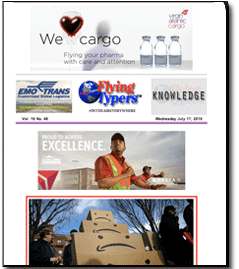|
Lior Ron (above) is a 42-year old Israeli-born
businessman that in 2016, along with Anthony Levandowski and some others
co-founded Otto, a self-driving truck company.
Both Lior and Anthony went to work at Uber
after Uber bought Otto in 2016.
But then Anthony was fired from Uber after
a dustup, wherein the executive was accused of stealing Google’s
self-driving car trade secrets for use in Otto’s technology.
Ron jumped from Uber, after Uber paid Google
parent company Alphabet $245 million to settle the dispute.
Well in 2019, Ron is back at Uber Freight,
now that Uber has finally closed the deal for Otto Trucking that is currently
operating as part of the Uber firmament, but as a stand-alone entity.
In the USA, Uber Freight connects 48 states
and reportedly generates more than $125 million in quarterly revenues.
Uberizing Logistics Keeps On Truckin’
“We fundamentally believe there’s
a new era of opportunity in logistics,” Ron said.
“Technology streamlines things, connects
things and that builds trust in physical networks.
“With the logistics market currently
representing 12 percent of global GDP,” Ron said, “there’s
an even greater need for solutions that bring value to trucking industry
stakeholders besieged by rising costs, a 98 percent driver turnover rate
and a litany of inefficiencies ranging from long delays at facilities
to ‘empty’ miles in which trucks run with vacant trailers.
“Logistics is running in the wrong
direction … and the entire ecosystem is struggling,” Ron said.
At Transform 2019, the big AI conference
held July 10-11 in San Francisco, Uber’s Director of Data
Science, Franziska Bell said, that she wants everyone who works
at Uber to think like data scientists.
“Our vision is to provide data
science expertise at the touch of a button,” Fran Bell declared.
“As example, the forecasting
platform we’ve developed is ‘platformization at ease,’”
she smiled.
“People just have to bring us
a list of business metrics they want to track, or backend metrics,
and then we automatically and dynamically set these thresholds for
them, and also keep them updated,” Fran Bell concluded. |
Reimagining Trucking
According to Ron, “recent technological
developments such as a mobile-enabled workforce, fully connected assets
and an intelligent, self-learning network allow Uber Freight to match
carriers and shippers to create logistics on demand.
“We want to connect the right truck
at the right time with the right shipper at the right price, and make
this entire process as streamlined as possible,” Ron declares.
Autonomous Trucking
Ron says the viability of self-driving trucks.
means that a driver could begin a trip at an origin facility and then
transfer that load to a self-driving truck for ramp-to-ramp highway haul
before another local driver receives the load and delivers it to the final
destination.
“Those first and last miles remain
critical,” Ron said.
“This is going to be a long game to
play and there’s plenty of room for numerous players,” Lior
Ron concluded.
Phase Two Uber Freight Europe
 Finally,
in Europe, Uber Freight Germany started up July 24, 2019 under Daniel
Buczkowski, Uber Freight's head of European expansion to secure part of
Europe's $500 billion trucking market. Finally,
in Europe, Uber Freight Germany started up July 24, 2019 under Daniel
Buczkowski, Uber Freight's head of European expansion to secure part of
Europe's $500 billion trucking market.
Germany is the second EU country to receive
service on the continent, after the Netherlands was announced March 20,
2019.
In Germany, Uber competes against local
operators including, Sennder, a company based in Berlin.
Interestingly, Uber’s attempts to
operate its signature passenger services in Germany have been limited
to eight cities after local taxi companies, politicians and the courts,
blocked further advancement.
|




